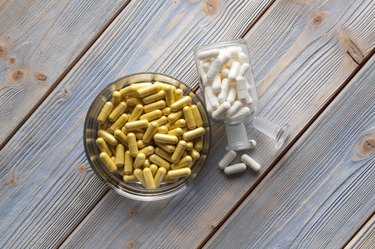
Iron is a mineral that helps with cell growth and differentiation and carries the oxygen in your blood throughout your body. Adult men need at least 8 milligrams of iron daily; for adult women that number is 18 milligrams. Teenagers and pregnant women have higher needs. Because of iron's role in cell growth, it's especially important that children receive the recommended dietary allowance of 11 milligrams for infants over 6 months old, 7 milligrams for toddlers, 10 milligrams for young children and 8 milligrams for older children. A poor appetite is one symptom of iron deficiency in children.
Iron Deficiency Anemia in Children
Video of the Day
Iron-deficiency anemia is a condition in which the lack of adequate iron in the diet leads to poor production of red blood cells, the oxygen transporters. Children are more at risk for IDA because they have frequent growth spurts and are less likely to get enough iron in their daily diet. Fatigue and a poor appetite are common symptoms of IDA in children. They may also have pale skin, a rapid heartbeat, irritability and dizziness. IDA takes a while to develop, and the diagnosis needs to be confirmed by lab tests. Iron supplements may be prescribed if the deficiency is severe, but they should be given under the direction of a physician, because too much iron can be toxic.
Video of the Day
Iron Supplements and Appetite
Several research projects have looked at the use of iron supplements to improve appetite in iron-deficient children in Africa. These studies had varying results. A study reported in the May 1994 issue of the Journal of Nutrition found that a group of 87 primary school children in Kenya had improved appetite after being given iron supplements. In 2001, Romain A.M. Dossa and others published a paper in the same journal stating that iron supplements did not affect appetite in 150 Beninese children between 18 and 30 months old who were anemic. In February 2004, the Journal of Nutrition carried yet another study of iron supplementation, this time affecting more than 400 preschool children in Zanzibar. This study found that, according to their mothers, the children's appetites had improved.
Iron Deficiency Anemia in Adults
Adults are less likely to report loss of appetite as a symptom of IDA. The most common early symptoms are fatigue, crankiness, feeling weak, headaches and inability to concentrate. As the condition progresses, you may notice brittle nails, pale skin, shortness of breath, a sore tongue and dizziness or light-headedness, especially when you stand up. If you're elderly or a vegetarian, if you're female and have heavy menstrual flow, if you have ulcers or other bleeding disorders or if you have trouble absorbing nutrients, you are more likely to develop IDA.
Iron in Your Daily Diet
Meat, poultry and fish are all good sources of heme iron, one of two types of iron available. Nonheme iron, which is not as easily absorbed, is more widely available. It is found in lentils, various kinds of beans and peas, spinach and fortified cereals. A healthy diet should supply your recommended dietary allowance of the various nutrients, including iron, but many multivitamin supplements also include iron. Additional iron supplementation should be done only after consulting your physician, as an excess of iron can be toxic. Pregnant women have a significantly greater daily iron requirement and are generally given prenatal vitamins to address this need. While there is no clear evidence that taking iron supplements will increase your appetite, talk to your primary care physician or a registered dietitian if you have such concerns.
- Office of Dietary Supplements: Iron
- KidsHealth: Iron Deficiency Anemia
- Journal of Nutrition; Iron Supplementation Improves Appetite and Growth in Anemic Kenyan Primary School Children
- Journal of Nutrition; Multivitamin-Multimineral and Iron Supplementation Did Not Improve Appetite of Young Stunted and Anemic Beninese Children
- Journal of Nutrition; Low Dose Daily Iron Supplementation Improves Iron Status and Appetite But Not Anemia, Whereas Quarterly Anthelminthic Treatment Improves Growth, Appetite and Anemia in Zanzibari Preschool Children
- Medline Plus: Iron Deficiency Anemia
- National Heart, Lung and Blood Institute: What Is Iron-Deficiency Anemia?